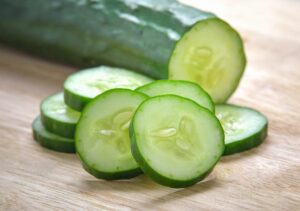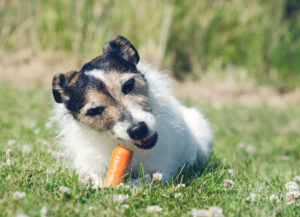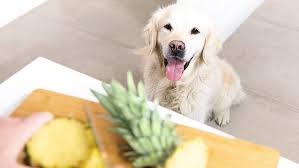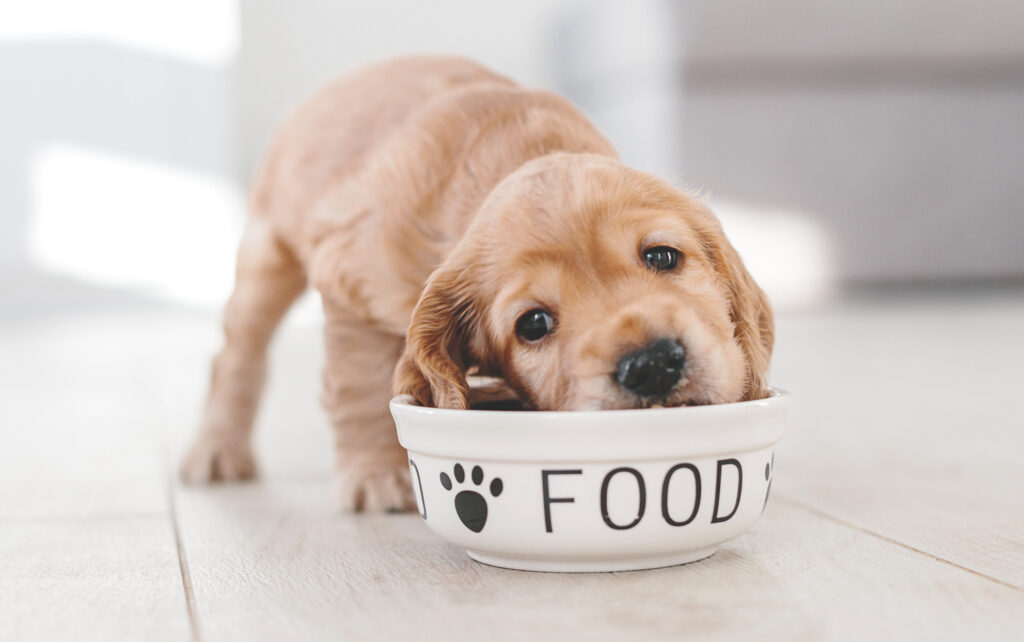Can Dogs Have Cucumbers?
-by Abhrajita Mondal
–Reading Time – 7 min Approx
–Edited by – Srishti Bhattacharyya
Dogs, unlike other house pets, are omnivorous by nature. Sometimes, you will find them stealing food out of your kitchen while other times you will find them chewing on vegetables, like cucumbers. This doesn’t mean that all vegetables and fruits are good for dogs. Everything that is healthy for us, may not suit them. You may make the mistake of giving them something unusual and it may lead to an emergency, leading to you rushing to the vet. The previous statement might give rise to the question, can dogs have cucumbers? Well, the answer is yes. Some fruits and vegetables are suitable for dogs and cucumber is one of them.
Are Cucumbers Safe for Dogs?
Cucumbers are safe for dogs. They are low-calorie and a crunchy option, that dogs truly love. Half a cup of cucumber slices contains only 8 calories. Moreover, it is low in sodium and fat. Sliced and diced cucumbers can be great food for your dogs, however, only in moderation. In the hot summer months, cucumbers can keep your dog cool. It is due to their high water content that they are a nutritious addition to dog meals. Your dog also finds the crunch similar to that of biscuits. Therefore, cucumbers make a great training treat as well. That answers the question can dogs have cucumbers.
If you ask your vet, they will advise you to follow the 10% rule. Cucumbers should make up 10% of your dog’s diet. If you have a small dog, like Papillon or Chihuahua, a single spear of cucumber might fulfill his daily requirement. While a German Shepherd or Great Dane needs a big bowl. Cucumbers are low in sugar and are a good diabetic option as well. Dogs do not know when to stop. They will keep on chomping on the cucumber pieces. That could lead to a choking hazard or overeating, or both which may also lead to stomach upset. To prevent this always chop them into small-sized chunks.
How Can Dogs Have Cucumbers?
You can serve cucumbers to your dog in more ways than one. Fresh cucumbers contain 96% water, vitamin C, vitamin K, magnesium, and potassium. These are important components of a healthy canine diet. However, do not serve pickles to your dog. They contain large amounts of oils and salt, which is not good. Pickles also contain garlic and onions, which are harmful to dogs. You can mix cucumber slices and cubes with other vegetables. Celery, cantaloupe, and pears are a great combination. It is the perfect dog-friendly salad.
You can even de-seed the cucumber and cut them into roundels, stuff the core with peanut butter or cream cheese. Your dog will love this. Another option is to freeze chunks of peeled cucumber and give them as a teether to your puppy. You can also top their favorite meals with cucumber cubes and slices; make the meals interesting. When introducing cucumbers, make sure to start with a small quantity initially. These are a few ways dogs can have cucumbers.
What Can Dogs Eat?
If you have a pet, you need to understand that dogs have a different digestive system. The foods which are safe for humans may not be safe for dogs. However, there are foods that are safe for both humans and dogs. You can give your dog a generous helping of carrots. Chewing carrots can remove plaque from their teeth and improves their teeth health. Carrots are the top resources for vitamin A. However, feed carrots in moderation. Too much of it can be bad. Secondly, you can feed your dog apples. They are a good source of vitamins A and C and contain large amounts of fiber. It can regulate your dog’s digestive system. However, rotten apples may lead to alcohol poisoning. So, you must be careful.

Most pet parents know that feeding white rice is beneficial. You can feed your dog white rice. It can alleviate an upset stomach and also helps to bind the stool. Dogs have low levels of lactose-tolerance. So, you should not give them too many dairy products to eat. However, milk, cheese, and yogurt in small quantities are considered safe for dogs.
Fish is a great non-vegetarian option for your dog. However, you have to ensure to cook it properly. Salmon, Tuna, and Shrimps are great options. Moreover, Salmon and Tuna contain Omega-3 fatty acids. It helps to keep the dog’s coat silky and shiny. Vitamin B in shrimp can help maintain healthy blood circulation. Plain and boiled chicken is also good for your dog. Therefore, you can feed this thrice a week at least. This covers what can dogs eat.
It is also a known fact that dogs love peanut butter. It contains vitamin E and B, niacin, fats, and proteins. However, you need to ensure to serve the unsalted variety. Some types of peanut butter contain Xylitol which is toxic for dogs. So, as a pet parent, you should read the labels. If you suspect ingestion of Xylitol, call for emergency help immediately.
Can Dogs Have Cucumber Skin?
Yes, they can. Most of the nutrients are in the skin of the cucumber. If you are buying organic, then the peel or skin is perfectly safe for your dog. But if your dog can have cucumber skin or peels, what about others? Do not throw away the other vegetable peels after peeling them. Vegetable peel or skin is actually stuffed with vitamins. Many people cook them in healthy fats and serve them. For hard peels, you can boil them and add them to dog food. That includes cauliflowers, broccoli, and root vegetable peels. For the soft ones, like carrots and beetroots, you can deep fry them. Your dog will love them.

Can Dogs Eat Pineapple?
There are numerous fruits too that are safe for dogs. While you are chomping on some slices, you may ask yourself can dogs eat pineapple? Yes, pineapples are completely safe for your dog. Moreover, it is energy-packed and nutritious. This tangy fruit is filled with several vitamins and minerals. Raw pineapples have a large quantity of sugar. So, you should not give it in large quantities. Follow the 10 percent rule. Anything in excess is bad for your animals. It might lead to obesity or indigestion.
Pineapples have many health benefits. They help in hydration and are very helpful in summers. Bromelain is a powerful enzyme that is present in pineapples. Moreover, it is anti-inflammatory in nature and has histamines; it keeps the coat in good condition.
Give your dog small chunks of pineapple. Additionally, if you have a small dog like Chihuahua, French Bulldog, or Papillon, give it in smaller quantities. If the dog is large, then you can give some additional pieces. Your dog can tolerate the soft inner part. So, ensure to remove the outer spiky skin before you serve pineapple to your dog. They may cause intestinal blockage and choke your dog. When dogs eat something new, it may cause inconsistent indigestion. So, give them some time. Make the pineapple slices or chunks tastier to suit your dog’s palate.
What Foods Can Kill Dogs?
Who can resist those puppy dog eyes? Can you? Well, we cannot. But this does not mean that you will treat your dog to anything and everything. Your excess love can be toxic for your dog if you are not careful. If you are giving some food containing Xylitol then you are in for a rude surprise. Anything that has Xylitol is harmful enough to kill your dog.

You should keep a list handy. Candy, gum, toothpaste, and some baked goodies contain copious amounts of Xylitol. Now, you know what foods can kill dogs. It can cause your dog’s blood sugar to drop and can lead to liver failure. Your dog may also have seizures.
Never give avocado to dogs. It contains Persin too much of which can cause vomiting and Diarrhea. Furthermore, if you have an Avocado garden at home, keep your dog away from it. Avocados can also get stuck in the intestine.
Alcohol is a strict no-no for animals. It has the same effect on dogs, that it has on people. It can cause vomiting, blood in the stool, and diarrhea, in the same way. The smaller the dog, the worse is the problem.
Onions and garlic are as bad. Some of the baby foods also contain onion powder and garlic powder. You can watch out for signs of vomiting and breathing issues. Caffeine is bad for your dog, so are cola, chocolates, and soft drinks. Thus ensure to keep these away. Grapes and raisins are also bad for your dog. Your dog may get depressed. Milk and milk-based products can cause stomach upset. Furthermore, it may cause allergies as well. So, steer clear of these products. Last but not least, chocolates are as bad. They are nothing but Theobromine. The most dangerous one is dark chocolate. You should also ensure to keep fruit seeds away from them. Raw eggs, meat, and fish are also bad for your dog. They contain certain bacteria.
So, now that you know what to feed your dog. As a pet parent, it becomes really difficult at times to ascertain what you should or should not give your dogs. If you follow the list, then you can ensure great health for your dog. Do not take chances. Do what is good for your furry pet today as the very famous and appropriate saying goes – a dog is man’s best friend.
-by Abhrajita Mondal
Dear Reader, Hope you liked the post. If you think our initiative “The Creative Post” is worth supporting, then please support us by paying the amount you think we are worthy of. We believe, the value of content should be decided by the consumer. Hence we request you to evaluate our worth and pay accordingly by Clicking Here.


